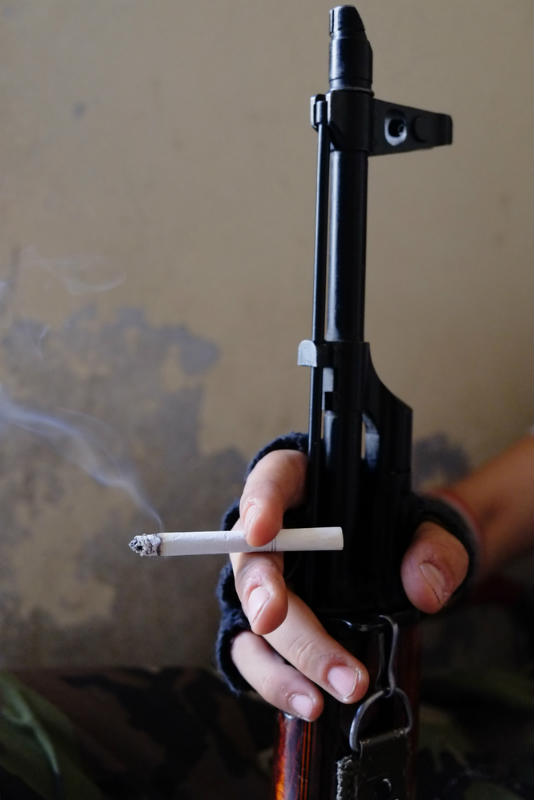After nearly four years in prison without trial, a Syrian civilian must pay a high price for freedom.
In 2011, anti-government protests spread throughout Syria. The situation soon escalated and resulted in a full-blown war. Violent clashes between the opposition and the regime were underway around the country.
In the heat of events, Mohammad, now 37, was arrested at a checkpoint in northern Syria while he was going to work. He was accused of using weapons against the government. But Mohammad didn’t know how to use a weapon, his family says. Based on his disability, he had been exempt of all obligatory military training.
Yet Mohammad was tortured for two months and then sent to a central prison for three and a half years without trial.
Paying for Freedom
As the violence continues after nearly five years, tens of thousands of civilians have been shoved into the Assad regime’s prisons. The lucky ones were those who had the chance to bribe their oppressors in exchange for freedom.
“My brother Mohammad was taken by security forces in July 2011,” says Mohammad’s brother, who refuses to reveal his full name. “He was tortured, humiliated and separated from his new-born child and wife for almost four years,” he adds.
Mohammad, who was an accountant in pre-war Syria, is physically challenged. His left leg has been paralyzed since childhood. He was in prison between July 2011 and February 2015, when his family paid a lawyer to have him released, according to his brother. Exact dates, names and places cannot be revealed due to security reasons.
“In November 2014, our father found a ‘lawyer’ after a long search in the corrupt system in Syria for someone to get him out,” Mohammad’s brother explains.
He says the desperate search had been mixed with hopes that, maybe, the rebels would take hold of the central prison in Aleppo, where Mohammad had been kept, and release him along with other detainees.
“The lawyer we found might not be the one you have in mind,” the brother notes. “He is more like a mediator between individuals in the government, on one hand, and distressed people like my brother and my family, on the other.”
According to Mohammad’s family, the mediating lawyer asked for a huge sum of money to have him released, and after bargaining, the price was $12,000. The mediating lawyer told the family: “The money is not for me. I just earn my mediating fees. They take the money, the judge does.”
“We were not sure if my brother would be released after paying the price,” Mohammad’s brother recalls.
The lawyer told the family that if they paid the money, he could make a call to the right “judge” and their son would be immediately out.
In an attempt from Mohammad’s family to pay the money, they tried to contact aid organizations asking for help. “While most of them haven’t replied yet, two responded negatively on the ground that they don’t support special cases,” the brother says.
The Oppressors
“Well, we managed to pay the government, or individuals in the government, to have my brother released,” he adds. “It was bitter to do so. We were sure that the people we are paying are the same people who buy bullets and explosive barrels to kill people like us. It was paying our killers to carry on slaughtering us.”
“It is painful to know that you are paying all what you have to those who displaced you and your family, killed your relatives and siblings, destroyed your home and failed your country. It is more painful to know that they continue doing so. Thanks to the people like us who pay them to become stronger,” he says.
The family is now in a safer place and in debt—so too is the newly released son. Before he was released, Mohammad said: “I am not sure that I want to leave the prison because I don’t have a perspective about what to do next.”
“He had to survive to get out of the prison,” his brother mentions. “At the time the chance presented itself, he became reluctant. He is a man in debt, psychologically destroyed and traumatized.”
Mohammad is now relatively far from the regime-controlled areas. He finally met his family, wife and now 3-year-old daughter.
Tens of thousands of innocent civilians are still neglected in the regime’s secret torture chambers and prisons, from which several thousands died out of hunger, torture or disease.
*[A version of this article was also featured by MPC Journal.]
The views expressed in this article are the author’s own and do not necessarily reflect Fair Observer’s editorial policy.
Photo Credit: Volodymyr Borodin / Shutterstock.com
 We bring you perspectives from around the world. Help us to inform and educate. Your donation is tax-deductible. Join over 400 people to become a donor or you could choose to be a sponsor.
We bring you perspectives from around the world. Help us to inform and educate. Your donation is tax-deductible. Join over 400 people to become a donor or you could choose to be a sponsor.
Support Fair Observer
We rely on your support for our independence, diversity and quality.
For more than 10 years, Fair Observer has been free, fair and independent. No billionaire owns us, no advertisers control us. We are a reader-supported nonprofit. Unlike many other publications, we keep our content free for readers regardless of where they live or whether they can afford to pay. We have no paywalls and no ads.
In the post-truth era of fake news, echo chambers and filter bubbles, we publish a plurality of perspectives from around the world. Anyone can publish with us, but everyone goes through a rigorous editorial process. So, you get fact-checked, well-reasoned content instead of noise.
We publish 2,500+ voices from 90+ countries. We also conduct education and training programs
on subjects ranging from digital media and journalism to writing and critical thinking. This
doesn’t come cheap. Servers, editors, trainers and web developers cost
money.
Please consider supporting us on a regular basis as a recurring donor or a
sustaining member.
Will you support FO’s journalism?
We rely on your support for our independence, diversity and quality.







